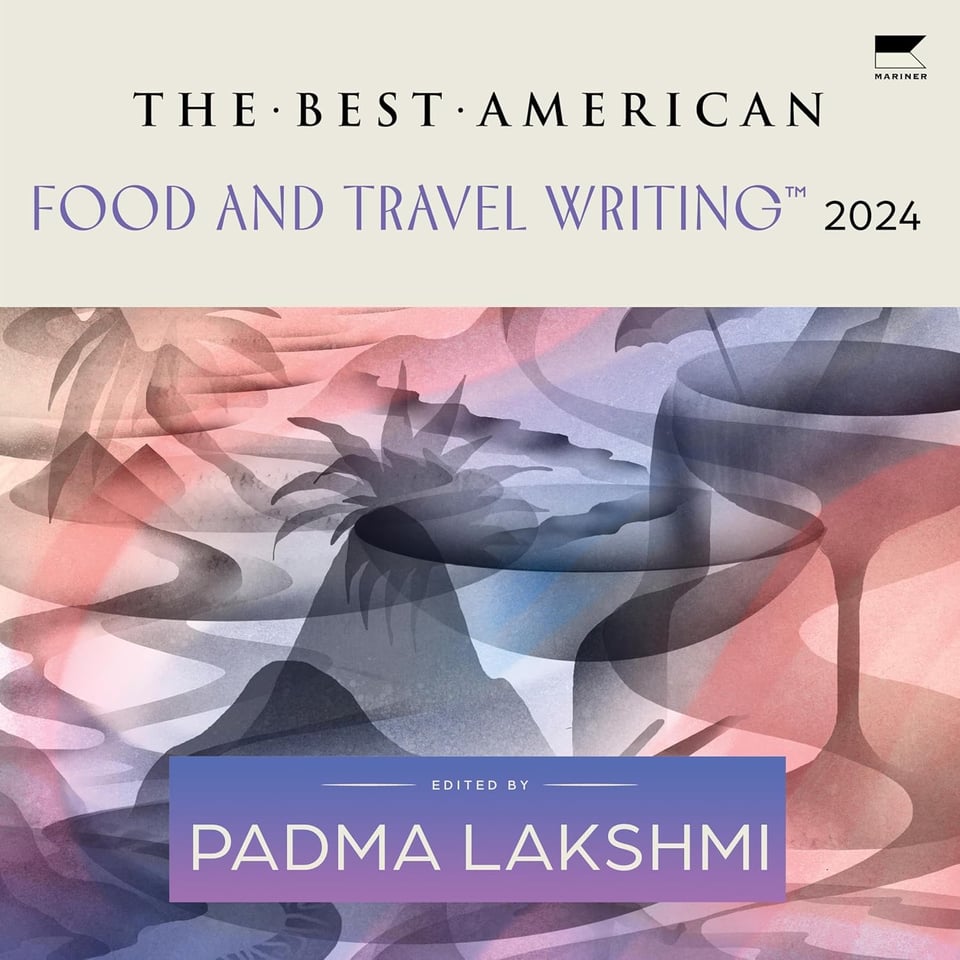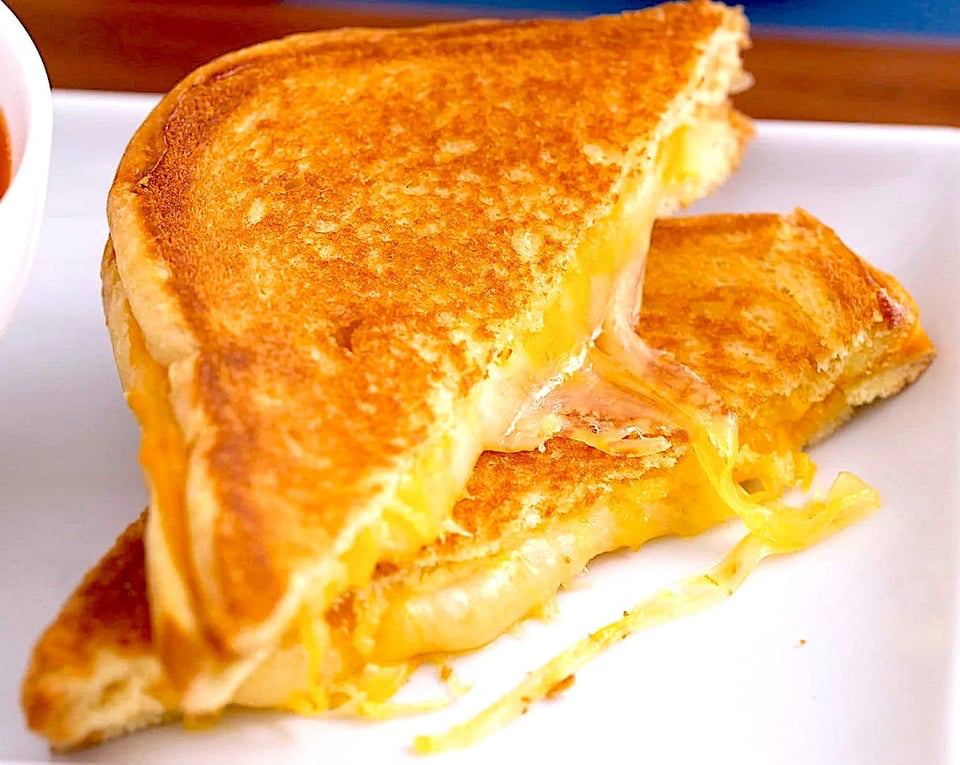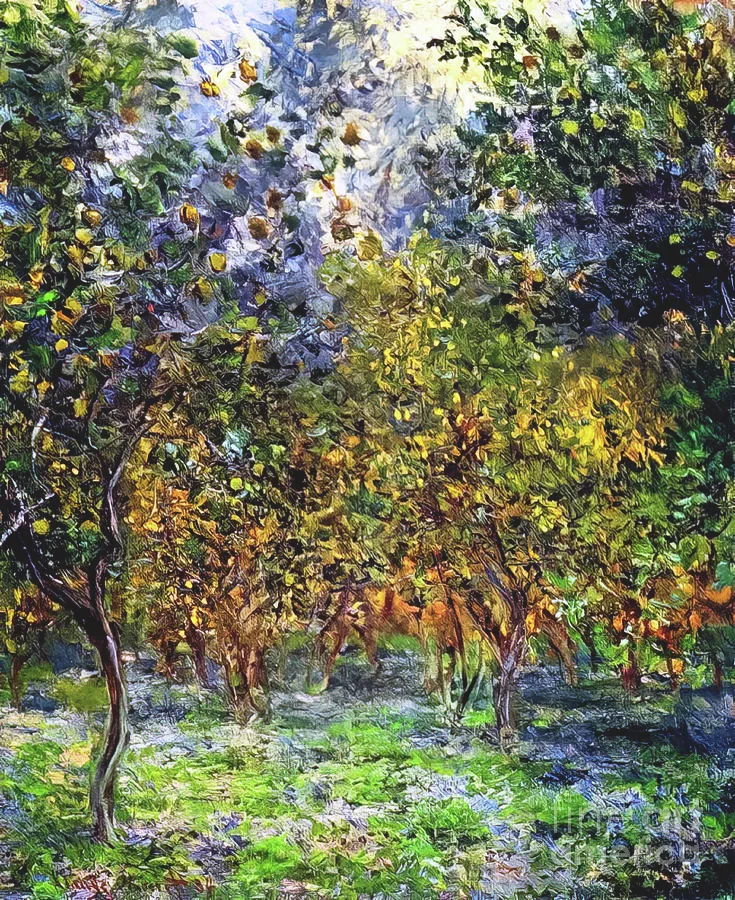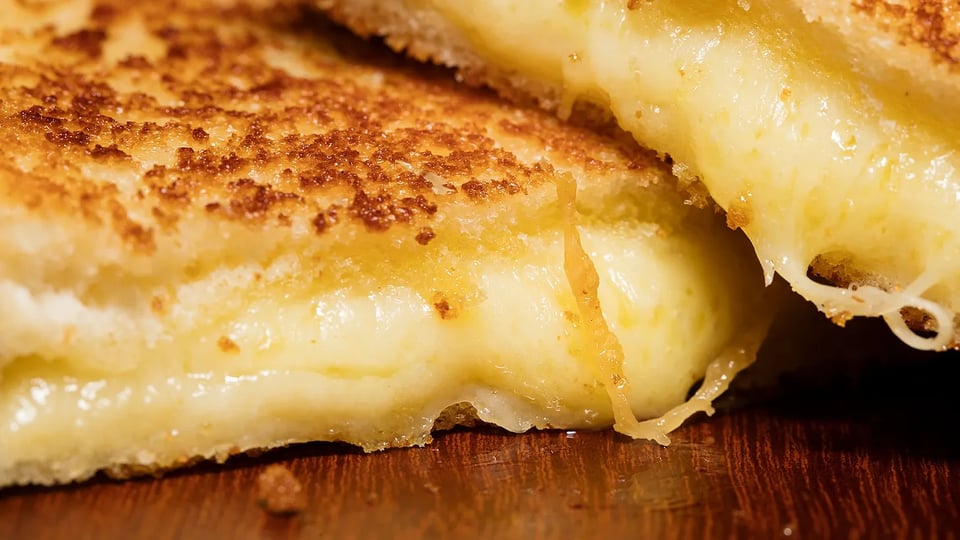The Best American Grilled Cheese Sandwich Essay

Welcome back to Notable Sandwiches, the feature where David and I travel the world on wings made of bread, chronicling Wikipedia’s List of Notable Sandwiches, in alphabetical order. This week, a look back at an old favorite: the grilled cheese.

"I for one never expected an essay about grilled cheese to make me cry," writes Padma Lakshmi, internationally famous chef, in her introduction to this year's Best American Food and Travel Writing, which came out yesterday. "But Talia Lavin's 'Notable Sandwiches #75: Grilled Cheese,' written with the religious fervor of an initiate, impossibly sincere even as it winks at you, is both a blessing—of the ‘small and perfect thing’—and a kind of benediction, as is each piece here."
Her declaration that my work made her cry made ME cry, in a salty and delicious chain of events. Because being a writer is, perhaps above all things, lonely. And selling yourself, all day, every day, is wearing and hard. (As is undertaking a multi-city book tour while suffering from agoraphobia.) This kind of praise—the idea that your work touches people to the quick, and draws out tears—makes it worth it.
So here we present the Grilled Cheese Essay in fullness, in the hopes that it will inspire you to joy.
And if you need yet more inspiration—today is October 25, St. Crispin's Day, subject of one of Shakespeare's most famous and rousing speeches. Go out and face your problems like Henry V did some Frenchmen. Allons-y!

Notable Sandwiches #75: Grilled Cheese
In writing about the grilled cheese sandwich, I find myself with little to offer but praise. It is difficult to encounter such a thing and not overrun the page with the fervency of my gladness.
This is not a column where I will carp and complain—about air-fryer grilled cheeses, or fancy gourmet grilled cheeses, or Kraft-single grilled cheeses, or the proper application of butter, or the appropriate pan, or the degree and nature of the condiments. To me, each grilled cheese is enough, and more than enough. In this world so full of slaughter and fire, where doubt and monstrosity abound, this much is clear to me: the grilled cheese is a small and perfect thing. And how many of those are there?
So my position on the grilled cheese is unabashedly boosterish, and moreover, it is agnostic towards ingredients and provenance. To your grilled cheese you may add caramelized onions or avocado; bacon, turkey or ham; chutney or cornichons. Make it with Wonderbread or a freshly-baked eighteen-grain country loaf sourced from fields you cultivated yourself in a cantilevered sky-farm with the finest hydroponics. Add goat cheese or smoked gouda or aged cheddar or unidentified plasticine processed cheese product; heat it in a pan or over a flame, under a broiler, in a dutch oven, or with an acetylene torch. I do not care. You have composed something perfect with your own hands. You have made something that will warm and satisfy you. You have, for a small moment, partaken of the act of creation that grants the human animal its sliver of divinity. You have done so by means of the grilled cheese sandwich.
From two perfect things—bread and cheese—arises a more perfect union. In contemplating it and its lessons I think of this fragment from Fernando Pessoa’s “Odes”:
To be great, be whole: nothing that's you
Should you exaggerate or exclude.
In each thing, be all. Give all you are
In the least you ever do.
The whole moon, because it rides so high,
Is reflected in each pool.
Each grilled cheese sandwich is entirely itself, like the moon is its whole self in a barrel of water. What else could it be? It is enough. To encounter it is to encounter something made for pleasure which gives pleasure in the beholding and in the consuming.

The simplicity of the sandwich engenders its own kind of awe: an internal pause at the perception of this unalloyed good. Describing that complex emotion makes me think of another poem, by Eugenio Montale, about the perfection of lemon trees in bloom:
It is like rain in a troubled breast,
sweet as an air that arrives
too suddenly and vanishes.
A miracle is hushed; all passions
are swept aside. Even the poor
know that richness,
the fragrance of the lemon trees.
You can be too poor or too ill or too overwhelmed to obtain a grilled cheese sandwich, but the thought of one is attainable to anyone; the ideal is there, pleasant to the mind parched of gladness.
I imagine a wheel on which I am turning dizzily and perpetually on the verge of falling off, and then I think of the small and simple and perfect thing, and the wheel judders to a halt and I am blessed with stillness. Joy changes you, it smashes the dark wheel: considering the grilled cheese sandwich I am as Nicole Callihan writes all moonshine on the snowbank, clockwise back to a better self. This thing is humble, not hallowed; it provides not ecstasy, but satisfaction, which is easier to obtain and less giddy to receive. You can hold it in the palm of your hand and be content.
Consider this: each grilled cheese sandwich is a reflection of all other grilled cheese sandwiches that have come before it. All are part of a great whole that rings the world in fat and starchy warmth. Each grilled cheese sandwich bears commonality with each other grilled cheese, in all their guises; it is easy to get wrapped up in the particularities, the innumerable recipes, easy to cavil and quibble and doubt, but perhaps better, and certainly more gentle, to regard the grilled cheese sandwich as an ideal, a thing-in-itself. Faced with this perfect thing, the idea of the small good whole, I am pleased and undone at once.
The Sword and the Sandwich is a newsletter about deadly serious extremism and serious sandwiches. Please consider supporting this work with
a paid subscription.
I am hungry for joy lately. Perhaps you are too. The grilled cheese sandwich for me is an object of consistent joy, which is different in kind than the transcendent ray-through-the-clouds joy that graces any life too rarely. Perhaps that makes it more valuable; reliable pleasure, ordinary pleasure, is as common as light and as necessary. It is only in the consideration of it that I come to appreciate how this mundane thing can be an object of desire and delight. With effort and after much contemplation I think myself toward joy, and welcome its arrival. Life must be leavened by joy to rise; stand and let it in; it approaches with soft footfalls and is easy to miss, or to begrudge in petulance or fervor.
Denise Levertov, too, writes about the pleasure that arrives through effort:
I like to find
what's not found
at once, but lieswithin something of another nature,
in repose, distinct.
Gull feathers of glass, hiddenin white pulp: the bones of squid
which I pull out and lay
blade by blade on the draining board—tapered as if for swiftness, to pierce
the heart, but fragile, substance
belying design. Or a fruit, mamey,cased in rough brown peel, the flesh
rose-amber, and the seed:
the seed a stone of wood, carved andpolished, walnut-colored, formed
like a brazilnut, but large,
large enough to fill
the hungry palm of a hand.I like the juicy stem of grass that grows
within the coarser leaf folded round,
and the butteryellow glow
in the narrow flute from which the morning-glory
opens blue and cool on a hot morning.
Still, life can’t all be squid bone and glass-feathers; some pleasures must be simple. As I ponder joy I long for it and for ease; for senses immured in pleasure, for a mind upturned by wonder, for the small good moment prolonged forever.
It is, on the whole, a good thing that our senses are dulled and subsumed by care. Should we stop and observe each perfect thing—the vast, for example, fireworks of dying the trees are now engaged in, as they are each autumn; the coarse grass-stems on the brown ground; the silky peel of an apple; the way cold water feels on the tongue—if we were to feel them completely, we would have no time for any of the rest of it. We would bathe in wonder and cease there, in the pathless woods of pleasure. Nothing would get done and no one would get born; we would be lost in admiration. I can think of worse ends but admit the inefficiency of astonishment. Still I think there could be more room for it. More joy.

Every joy erodes; survival necessitates that no state be fixed. But we can hope for its return, as light returns. I hope you find your small perfect thing, and in doing so welcome joy’s arrival. I recommend going to your kitchen and finding a loaf of bread, and adding to it cheese, and adding to that heat, and from this meeting of good things, attaining a moment of satisfaction to which you may return at any time. Toward that benediction I end this column with a return, to the poem of Montale and his lemon trees, and its magnificent ending, in which the sun pours forth in gladness; may you too be gladdened; there are still small perfect things in this bad world, grilled cheese, and lemon trees.
The illusion wanes, and in time we return
to our noisy cities where the blue
appears only in fragments
high up among the towering shapes.
Then rain leaching the earth.
Tedious, winter burdens the roofs,
and light is a miser, the soul bitter.
Yet, one day through an open gate,
among the green luxuriance of a yard,
the yellow lemons fire
and the heart melts,
and golden songs pour
into the breast
from the raised cornets of the sun.

-
Talia, I have followed you for a long time. You are a brilliant writer. I have only admiration for your bravery in tackling a book tour. Writing is a lonely path, but know that there are many, like myself, who are enriched beyond measure by sharing your travels.
-
I loved every delicious word in this essay. And...when I was a child my parents asked me what I'd find when I got to heaven. I replied, "God and Mary and grilled cheese sandwiches." This became family lore.
-
Hmmm. My comment didn't post so I will write it again: I loved every delicious word of this essay. And...when I was a child my parents asked me what I'd find when I got to heaven. I replied, "God and Mary and grilled cheese sandwiches." This is now family lore.
Add a comment: